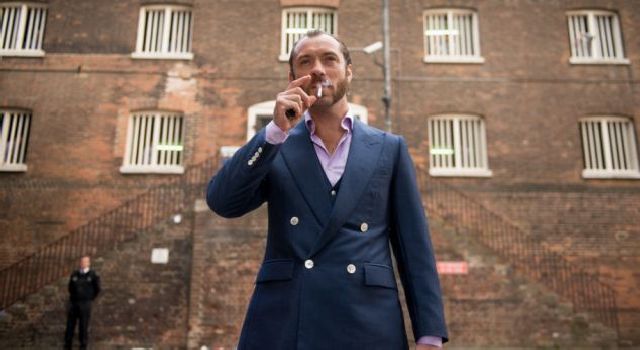Dom Hemingway (2013) 
“Jude Law is Dom Hemingway and you’re not.”

Director: Richard Shepard
Cast: Jude Law, Richard E. Grant, Demian Bichir
Synopsis: After spending 12 years in prison for keeping his mouth shut, notorious safe-cracker Dom Hemingway is back on the streets of London looking to collect what he’s owed.
I’ve never been a huge fan of Jude Law, but every now and then he delivers a performance that demonstrates just how good an actor he can be when presented with the right part. Paradoxically, Dom Hemingway seems to be exactly the kind of role you’d expect Law to fumble. Hemingway is big, loud, larger-than-life; a volatile, mercurial force that crashes through his world with the violent force and vitality of a hurricane, and he seems to be a part made for a physical actor like Tom Hardy rather than the more tender talents of Law. But then, in Sexy Beast, Ben Kingsley showed just how effective an actor playing against type can be when cast in a violent gangster role, and it’s difficult to believe Law didn’t watch that movie at least once in preparation for Dom Hemingway. That’s not to say he’s used Kingsley’s performance as a template for his own, however — Hemingway is a frighteningly well-observed character whose brash manner and expletive-laden verbosity hide a wounded heart, and Law adroitly reveals every conflicting aspect of this complex man.
It’s clear from the controversial opening scene in which a naked Hemingway waxes lyrical about his manhood while receiving oral stimulation from a fellow prisoner that he is a survivor who strives to control his environment through intimidation. He’s built a legend around himself which sees other prisoner’s chanting his name on the day he finally walks through the prison gates to freedom. But by passing through the gates he also forsakes a world he owned to one over which he has no control and which is deaf to his tireless self-aggrandising.
Hemingway hooks up with his old friend Dickie Black (Richard E. Grant — The Iron Lady), with whom he’s soon off to France to rendezvous with Russian Mafia boss Fontaine (Demian Bichir — Machete Kills) from whom he expects generous payment for keeping Fontaine out of prison by refusing to grass during the twelve years he was banged up in prison, even though to do have done so would have meant a much shorter sentence. And despite a drunken outburst against Fontaine which should have resulted in his swift execution, a generous payment is exactly what he gets — only to see Fontaine’s girlfriend (Madalina Ghenea) drive off with his just rewards following a car crash which sees Fontaine speared by a fender (this fatal car crash, by the way, has to be the funniest ever committed to celluloid). Distraught over the loss of his money, Hemingway returns to Britain and belatedly tries to reunite with Evelyn (Emilia Clarke), the daughter he hasn’t seen since she was a little girl…
The above synopsis probably gives an insight into the haphazard nature of Hemingway’s approach to life on the outside. A three day sex-and-drugs binge with two hookers thoughtfully supplied by Fontaine on Hemingway’s release takes priority over the three-quarters of a million that awaits him in France, which is, in turn, more important than reconnecting with the daughter from whose life he has been absent for more than half her life. And before any of that, his first act upon leaving prison is to beat to a pulp the working man who married Hemingway’s former — and now deceased — wife after Hemingway was put away. Following Hemingway’s drunken, halting progress necessarily means that the movie’s structure is also fairly aimless. There’s no plot to speak of, just a series of events that are either provoked by, or happen to, our anti-hero as he stumbles towards a belated understanding of what’s important in life.
Dom Hemingway, the movie, provides an entertaining — and sometimes enthralling — journey in the company of the type of man that most of us would take pains to avoid in the real world. And yet, for all his boorish behaviour, Hemingway makes for fascinating company, and we’re always keen to know what he’s going to do next. As the movie unfolds, the abrasive surface is smoothed down to reveal a glimpse of the better man Hemingway might have been had he not been a victim of his own nature, and Law does a commendable job of keeping his character’s arc a believable one. In fact Law’s transformation into a hard man is so convincing it’s impossible to associate him with the same actor who brought us the metrosexual Alfie back in 2004. Writer and director Richard Shepard’s screenplay does come across as too verbose at times — particularly during the opening act — as if the screenplay was adapted from a stage play rather than written for the screen, but as the film unfolds we find ourselves irresistibly drawn into the strange world of Dom and Dickie, until we somehow find ourselves rooting for a character by whom we were initially repulsed.
httpv://www.youtube.com/watch?v=vHOWTGto4AM
